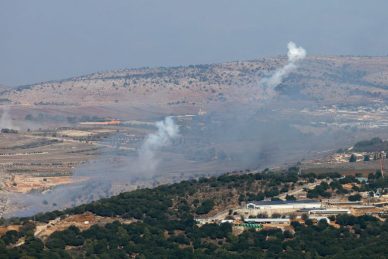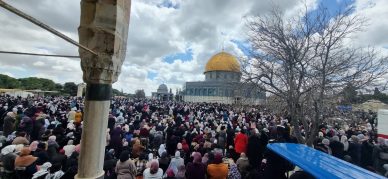Introduction: The fact that the Holy Places in Jerusalem belong to millions of people has naturally predisposed the city of Jerusalem to many bloody experiences throughout successive historical eras. The Jews have their own Holy Places for example Al Haykal which is supposedly located under Al Aqsa Mosque which is considered Islamic property. The Christians also have their own Holy Places. Therefore a necessity to internationalize the city and for it to be ruled by the United Nations with full guarantees of freedom of religion was a natural proposal given the circumstances.
However Arabs and Muslims have resisted this proposal because the city is still occupied and it prospered as a direct result of Islamic rule. Therefore recent attempts to implement this proposal have failed namely the “Free Danzage” or “Teresta” agreements. Israel supported these attempts before Jerusalem was occupied by the Israeli forces whereafter they rejected them and declared the city the permanent capital of Israel. Consequently the Israeli forces have transformed the Islamic features of the city into completely Jewish and Zionist ones-demographically educationally culturally and economically. It is also regrettable that the Israelis have persisted in carrying out several excavations under and around the Islamic Holy Places. It is also important to note that each side cannot ignore the other’s rights in the city if there is to be a comprehensive solution to the peace process. On the one hand Muslims have never ignored the rights of either Jews or Christians to reach and visit their Holy Places or to perform their rituals. On the other hand both Jews and Christians theoretically do not ignore the Muslims similar rights. As a matter of fact the city is not Jewish in origin to begin with; on the contrary it is an Arab-Islamic city especially the eastern part which was occupied in 1967 as well as the western part occupied in 1948. The city has been the centre of the Arab-Israeli conflict regarding how the city should be ruled especially after Israel declared it as the unified capital of Israel and carried out several aggressions and violations against both Islamic and Christian Holy Places.
The Egyptian attitude toward the sovereignty and holiness of Jerusalem is one that considers the city as an occupied Arab territory and as a part of the West Bank and therefore should be ruled by the Arabs and the Palestinian inhabitants of the city should have their rights as such. Egypt believes that Security Council resolution 242 should be implemented because the city is a part of the Arab land occupied in 1967 therefore it should be ruled by the law of war until it is restored to the Arabs. This attitude implies that there is another Jerusalem-West Jerusalem-that had not been occupied in 1967. If the status of the city has been taken for granted the Egyptian attitude gives the right for all the believers of the three main faiths to perform their rituals freely and without discrimination. This attitude was confirmed through the correspondence between Egypt and the U.S. after the Camp David peace treaty was signed. The treaty suggested that the city should be ruled by a joint Municipal Council comprised of both Arabs and Israelis so that the city would not be divided especially Arab Jerusalem which has been considered a part of the occupied land in 1967 and accordingly cannot be annexed to Israel in any case. Egypt does not use the terms “East” or “West” Jerusalem but rather uses the term “Arab” Jerusalem to signify a unified city with the Holy Places controlled by representatives of each faith while the Municipal Council would manage the administrative affairs of the city. Thus we see that Egypt considers Jerusalem as a unified city with full guarantees of the freedom of religion through two channels: first the Holy Places can be controlled by representatives of their followers and secondly the city can by ruled by a joint Municipal Council (1). The attitude of the other international forces toward the issue of sovereignty and holiness can be explained in the following:
1. The attitude of Arab-Islamic forces: The attitude of these forces could be viewed through the resolutions of both the Arab League and the Pan-Islamic conference especially the resolutions having been issued recently because some of these have been changed. The resolutions of the Arab League were more tolerant and sympathetic because they consider Jerusalem an occupied Arab-Islamic city. The Arab summit conference held in Fass in 1981 and then again in September 1982 stressed the withdrawal of the Israeli forces from all the 1967-occupied territories (including Jerusalem) the removal of all settlements built after that date and the West Bank and Gaza Strip to be ruled by the United Nations so that a Palestinian State could be formed with Jerusalem as its capital. The conference addressed the issue of freedom of religion in accordance with Security Council resolutions. As far as the Islamic conference was concerned several resolutions have already been taken most notably the resolutions taken at the tenth session held in Fass in May 1979 and the twelfth session of the Ministers of Foreign Affairs conference held in Baghdad in June 1981-in particular resolution 12/2 which relates directly to Jerusalem-in addition to the resolutions adopted during the thirteenth session which was dedicated to Palestine and Jerusalem stressing that Jerusalem is an Arab-Islamic city and it should be restored as the capital of the Palestinian State (20). However the resolution does not mention East or West Jerusalem which means that the city is considered a wholly-unified Arab-Islamic city. This attitude was stricter than the one taken at the Fass conference in 1982 though it too guaranteed the freedom of religion and stressed that the city should be restored to the Arabs even by force; it also stressed the Islamic identity of the city by comparing it with the other Islamic capitals (3) and finally boycotting the Zionist State and registering the city as an ancient city at UNESCO in order to be protected against any Israeli violations (4).
2. The attitude of the U.S.: This attitude has been different from the attitudes of the other countries because of its bias in favour of Israel which was revealed through the following documentation:
The speech delivered to the General Assembly by the American representative at the UN in 1967.
The speech delivered to the Security Council by the American representative at the UN in 1969.
Regan’s proposal issued in 1983 (5) to settle the Palestinian question.
The first item of the American attitude is related to the holiness of the city for the three main faiths and so it is considered one of the holiest cities throughout the world. Concerning this notion and its impact on the international and legal status of the city the U.S. has considered East Jerusalem an occupied city and so all the changes made by Israel are illegal and the city should be unified under the joint administration of both Arabs and Israelis especially the Holy Places. Concerning the sovereignty of Jerusalem the U.S. refers to the ultimate settlement of whole Middle East problem which should be solved through bilateral negotiations between the Arabs and the Israelis to achieve a comprehensive and lasting solution. Regan’s proposal had added two more points to the American attitude: first Jerusalem should be a unified city but only through negotiations; and secondly the Middle East problem in general should be solved through negotiations and the application of UN resolution 242 (6). Consequently given that the American attitude is quite different from the attitude of the other international powers it did not decide the final right of sovereignty in Jerusalem however this can be decided through negotiations even though both sides agree that East Jerusalem is an occupied city. Moreover the U.S. voted against resolutions 476 and 478 issued by the Security Council in 1980 and which considered the annexation of the city an illegal act and it should be ceased promptly. The proposal to move the American embassy to Jerusalem was first suggested by Regan’s executives when they decided to purchase a piece of land in Jerusalem even though it was an occupied city. This was a serious development in the American attitude in addition to the notion of the unified capital of Israel when the American Congress congratulated Israel on the fifteenth anniversary of the unification of the city in 1992 when President Bush was in office. The resolution to move the American embassy to Jerusalem was issued on 13 October 1995 and included the following items:
(a) Each independent State has the right to establish its capital in any part of its own country ruled by its authorities.
(b) Jerusalem has been the capital of Israel and the home of the Israeli president the parliament the supreme court and various ministries centres and institutions.
(c) The city has been divided from 1948 to 1967 but the Jews were not allowed to reach and visit their Holy Places.
(d) The city has been the unified capital of Israel since 1967 with full guarantee for the freedom of religion.
(e) The American Congress confirmed the fact that the city should be unified during the period 1990-1992. The U.S. justified this by stating that it has the right to establish its embassy in the statutory capital of any country except Israel because Israel is considered the strategic ally of the U.S. Also several activities and meetings have been held in the city under the premise that it is the capital of Israel.
These are some of the most important reasons behind the resolution initiated by Congress which has considered the city as the unified capital of Israel since 1967; it is also the home of several state departments with full freedom of religion. However these reasons are illegal and are against international law. First of all the area where any State establishes its capital should be the property of that State itself not an occupied territory such as the case with Jerusalem. Also Jerusalem was occupied by force although it had been ruled by the Arabs and Muslims for more than 1000 years proving that the Israeli occupation is illegal. Moreover the Arabs and Muslims who ruled the city allowed the Jews to reach their Holy Places even though previous rulers had prevented them from doing so for a long time. The United Nations pleaded with Israel to cancel the resolution of annexation because it was illegal and so the attitude of the Congress went against the international law. Finally even though the resolution was not an executive order it had to be approved by the American President who pointed out the serious consequences of such a resolution. The Arabs should put a stop to this even if it means ceasing relationships with both the U.S. and Israel including the negotiations.
3. The attitude of the former Soviet Union: The former Soviet Union supported the Arab rights within the Palestine Question through recent documents concerning this issue. The former Soviet Union considers Jerusalem an occupied city as of 1967 and it should be restored to the Arabs as an indivisible part of the Palestinian State with full freedom of religion for the three main faiths in accordance with Security Council resolutions (7). Thus the former Soviet Union has confirmed the establishment of the Palestinian State in the occupied territories of 1967 through negotiations under the patronage of the PLO as the sole and legitimate representative of the Palestinians.
4. The attitude of the United Nations: The first resolutions taken by the UN such as the resolution of the division of Palestine (8) the Bernadout proposals and other resolutions issued in 1948 (9) and 1949 (10) supported the internationalization of Jerusalem under the supervision of the UN in order to guarantee full freedom of religion. These resolutions were not implemented although they had been planned to guarantee the protection of the Holy Places and the civil public rights for the inhabitants of the city (11). Israel occupied West Jerusalem and Jordan ruled the eastern part after Al Nakba (the Catastrophe) in 1948. Even the UN considered Jerusalem as an occupied city and as such considered that it should be restored to the Palestinians to be the capital of their future State in the West Bank and Gaza Strip with full guarantees of freedom of religion. Both the General Assembly and the Security Council agreed on this point and have continued to ask Israel to abolish all procedures implemented in this regard in both parts of the city either in 1948 or 1967. Most of the international powers except the U.S. agree that East Jerusalem is an occupied Arab territory and should be restored as the capital of the Palestinian State. The U.S. confirms that this matter should be settled through negotiations with freedom of religion guaranteed. The western part of the city was occupied by Israel in 1948 and it was internationalized and therefore not included in the division resolution as it is considered an occupied territory as of 1948 (12). This was not decided by the UN resolutions yet it is useful to cancel the Israeli procedures that were taken to change the features of the city before 1967. Unfortunately some Arab forces ignored the western part of Jerusalem because Israel would not give it up easily so they concentrated on the eastern part as the capital of the Palestinian State of the West Bank and Gaza Strip.















